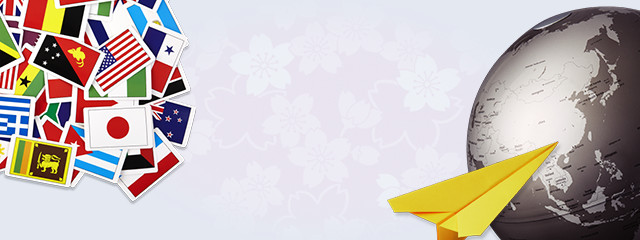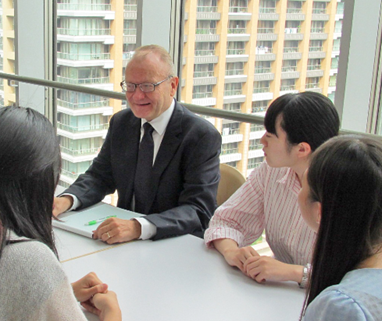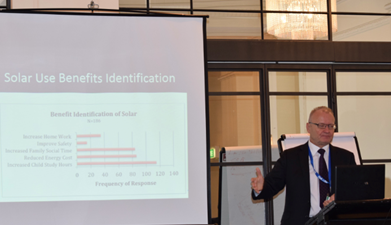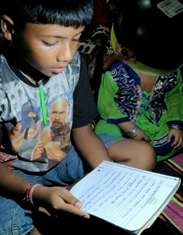
Faculty of International Studies
国際学部取り組み・プロジェクト紹介 詳細
更新日:2016年10月24日
新任教員インタビュー L.グリテベック先生:"Education in the GSE Program is above all transformational"
“Education in the GSE Program is above all transformational”
Interview with Dr. Gretebeck
Dr. Gretebeck has joined the Faculty of International Studies in this academic year 2016 and is responsible for teaching international-business related courses in the GSE Program. Here is an interview with him.
How did you become a researcher, or why did you decide to pursue an academic career?
I became engaged in research with two purposes in mind: First, I was intent at using knowledge learned to help organizations, particularly international NGOs, grow. Secondly, I became a researcher to better understand how best to help children in need. Of course, both objectives are interrelated: as international NGOs strengthen in terms of organizational structure, finances and program, these entities are better able to provide effective poverty alleviation programs.

Students engaged in discussing global issues
I believe that my passion for international development began at age 17 when I was an exchange student to the country of Indonesia. Looking back, this was a significant experience that opened my eyes to Asia and the world. I had a chance to witness poverty first-hand at such a young age, which shaped my studies and career moving forward.
Why did you choose Indonesia for your first experience abroad, and what kind of program were you a part of?
When I was in high school, I applied for a scholarship to serve as a foreign exchange student ambassador, representing the American Field Service Program (AFS). As such, individual applicants do not choose the specific country. Having said this, I said that I preferred to live and study in a country that was very different than the USA, and that I had a preference for a developing country.
Of course, my parents were surprised to hear that I would be living in the Indonesian city of Ujung Pandang, located on the northeast island of Sulawesi. Yet, I was warmly received by the Indonesia people, and had a positive experience as an exchange student. While I learned about a new culture and language, my time abroad was important to shape my world view and “planted the seeds” for a future international career.
Interestingly, the first foreign country that I saw from the plane was that of Japan. I recall flying over Japan and seeing the beauty of Mt. Fuji. It would be 7 years later before I would return as a teacher in the city of Kumamoto.
My graduate school advisor at Nagoya University, Wakabayashi Sensei, also played a key role in my academic development. He worked hard to guide me through my doctoral research over a period of 5 years. Unfortunately, he passed away soon after I completed my degree, but I remember him telling me to “use my knowledge to also help young people – especially college students – in Japan. In a sense, he taught me the passion of education.
In my readings, I am impressed with the words of wisdom provided by Mother Teresa. She said, “We cannot change the entire world, but we can change the small part of the world in which we live.” In my personal and professional life, I try to live up to this challenge.
In connection with the questions above, why did you choose the subject or the discipline you are in?
I chose the discipline of international development out of a desire to help the “poorest of the poor” in the world. For me, this area of interest is not merely one of teaching academic content and theory, but also being involved in a practical way to help children. For example, my research related to solar lighting in rural Cambodia and India – in cooperation with Panasonic - serves to help other poor children by showing the benefits of solar lighting.
One of my research findings was that the use of solar lights allows children to study approximately 2 more hours each day. This is significant because education is indeed the key to poverty alleviation. Moreover, families can save money by using solar lighting and then can spend more on food, medical care and education.
What are your impressions of Kyoritsu or the students of our faculty?
-
I am most impressed with the students at Kyoritsu Women’s University. In a very short period of time, I have discovered that students are seeking a good education that will lead to a good job. Most important, students at Kyoritsu are on a journey to understand what is most important in life, and also seeking to enter careers that give meaning and purpose. I often describe education as being TRANSFORMATIONAL. Indeed, education at Kyoritsu Women’s University and within the GSE Program is transformational because we are seeking to open students' hearts and minds to the world in which we live.
Kyoritsu Women’s University has a long and rich history of 130 years. Having said this, the world has indeed changed and we are now at a turning point to determine what type of education best meets the demands moving forward. In relation to that, I believe the university’s new GSE program is a step in the right direction, particularly because we aim to produce graduates who are not only proficient in English, but who have a global world view. Indeed, globalization now requires that academic institutions develop academic programs that give students the needed skills to complete and effectively contribute to our global society.
What do you expect of the students who will apply for entry to your seminar?
My teaching philosophy is to promote INTERACTION between the students. Quality education today is not defined as effective teaching, but rather effective learning. This means that students play an integral part of the learning process, and the key role of the teacher is that of serving as an effective facilitator. In short, students themselves should accept responsibility for their own learning. In other words, students must take the initiative to think of university study not just as a classroom activity, but something much more: education involves learning about our strengths and weaknesses, discussion with friends about issues that are critical to our time, traveling and learning about people of another culture, learning how to think critically about world problems, and developing a strong sense of values that will guide us throughout our lives.

Interactive teaching which is transformational
What is your actual research?
I have several areas of research interest. As I mentioned, my desire is to engage in research to help improve the lives of children living in poverty throughout the underdeveloped and developing world.
I am now engaged with a research project, in cooperation with Panasonic Corporation, to study the impacts of solar lighting on children, but with a particular emphasis on impacts in the areas of education, health, safety and family finances. Another related project is to better understand how companies through CSR programs can assist in helping to alleviate poverty.

Child uses solar LED
What does "CSR" refer to?
CSR refers to Corporate Social Responsibility. In short, CSR focuses on those various activities that companies engage to use their profit to help others in need. Following the lead of people like Bill Gates and Steve Jobs, global companies are now actively engaged in programs such building schools, feeding the hungry, and caring for the environment. CSR should not be viewed as something “extra” that a company is involved but, rather, a central part of strategic planning.
What is the biggest challenge facing Japan and Japanese education today – especially within the context of globalization?
The biggest challenge facing Japan and Japanese students in particular is to open themselves up and to learn about the world around them. Japan has often been described as a “Heisa shakai” or closed society. Yet, in this age of globalization we need to be open and fully engaged in our world. I was once asked, “How can Japanese students better know themselves and the world? “My response is that “Japanese students need to leave Japan – perhaps for a short period of time for work or study – to learn and really know about JAPAN.” In going abroad, one is able to more effectively understand the pros and cons of their own home culture. This is what I mean by transformational education. Secondly, Japanese students face a critical challenge of engaging in careers that are meaningful. I personally think students are looking for this value in life, and it is our role as educators to facilitate this growth.
(Interviewer: Lillian Swain)






